Books
2023
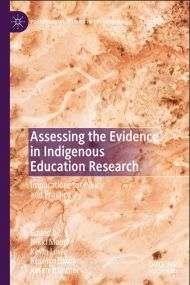
Editors: Nikki Moodie, Kevin Lowe, Roselyn Dixon, Karen Trimmer. Assessing the Evidence in Indigenous Education Research.
Implications for Policy and Practice
This book forms part of the series: Postcolonial Studies in Education (PCSE).
This book explores the current state of research on Indigenous education in Australia. In particular, these chapters focus on exploring deep and enduring questions about the failures of schooling to address the needs of Aboriginal communities. This book provides a systematic analysis of existing research to explain how connection to culture - and the recognition of Indigenous sovereignties and knowledges - are the keys to Aboriginal excellence in schooling.
2022

Little, A. Temporal Politics Contested Pasts, Uncertain Futures
Adrian Little demonstrates the ways in which different conceptions of past, present and future contribute to the nature of political conflict in the world today. Reacting against narratives of political disillusionment and apathy, he focuses on how a new understanding of political temporality can inform our approach to political problems. Little develops a theory of temporality focused on material politics. His argument is formed around three major cases in which the nature of past, present and future is contested: Indigenous politics in settler colonies, the politics of bordering and migration and the debates over the future of democracy. He shows how to rethink ways in which we can act on intractable issues in politics beyond philosophical analysis. In doing so he brings together a theory of temporality with a model of political action derived from process philosophy to reinvigorate temporal understandings of the problems that political actors face.
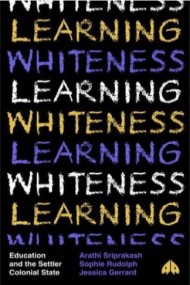
Rudolph, Sophie., Sriprakash. Arathi,.Gerrard, Jessica. Learning Whiteness: Education and the Settler Colonial State
Whiteness is not innate – it is learned. The systems of white domination that prevail across the world are not pregiven or natural. Rather, they are forged and sustained in social and political life.Learning Whiteness examines the material conditions, knowledge politics and complex feelings that create and relay systems of racial domination. Focusing on Australia, the authors demonstrate how whiteness is fundamentally an educational project – taught within education institutions and through public discourse – in active service of the settler colonial state.To see whiteness as learned is to recognise that it can be confronted. This book invites readers to reckon with past and present politics of education in order to imagine a future thoroughly divested from racism.
2020
López, Ligia (Licho), Coello, Gioconda. Indigenous Futures and Learnings Taking Place
Singularizing progressive time binds pasts, presents, and futures to cause-effect chains overdetermining existence in education and social life more broadly. Indigenous Futures and Learnings Taking Place disrupts the common sense of "futures" in education or "knowledge for the future" by examining the multiplicity of possible destinies in coexistent experiences of living and learning.
Taking place is the intention this book has to embody and world multiplicity across the landscapes that sustain life. The book contends that Indigenous perspectives open spaces for new forms of sociality and relationships with knowledge, time, and landscapes. Through Goanna walking and caring for Country; conjuring encounters between forests, humans, and the more-than-human; dreams, dream literacies, and planes of existence; the spirit realm taking place; ancestral luchas; Musquem hən̓q̓əmin̓əm̓ Land pedagogies; and resoluteness and gratitude for atunhetsla/the spirit within, the chapters in the collection become politicocultural and (hi)storical statements challenging the singular order of the future towards multiple encounters of all that is to come. In doing so, Indigenous Futures and Learnings Taking Place offers various points of departure to (hi)story educational futures more responsive to the multiplicities of lives in what has not yet become. The contributors in this volume are Indigenous women, women of Indigenous backgrounds, Black, Red, and Brown women, and women whose scholarship is committed to Indigenous matters across spaces and times. Their work in the chapters often defies prescriptions of academic conventions, and at times occupies them to enunciate ontologies of the not yet. As people historically fabricated "women," their scholarly production critically intervenes on time to break teleological education that births patriarchal-ized and master-ized forms of living. What emerges are presences that undiscipline education and educationalized social life breaking futures out of time.
This book will be of great interest to students and scholars of Indigenous studies, future studies, post-colonial studies in education, settler colonialism and coloniality, diversity and multiculturalism in education, and international comparative education.
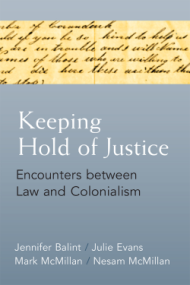
Balint, Jennifer, Evans, Julie., McMillian, Mark and McMillan, Nesam. Keeping Hold of Justice: Encounters Between Law and Colonialism
Keeping Hold of Justice focuses on a select range of encounters between law and colonialism from the early nineteenth century to the present. It emphasizes the nature of colonialism as a distinctively structural injustice, one which becomes entrenched in the social, political, legal, and discursive structures of societies and thereby continues to affect people's lives in the present. It charts, in particular, the role of law in both enabling and sustaining colonial injustice and in recognizing and redressing it. In so doing, the book seeks to demonstrate the possibilities for structural justice that still exist despite the enduring legacies and harms of colonialism. It puts forward that these possibilities can be found through collaborative methodologies and practices, such as those informing this book, that actively bring together different disciplines, peoples, temporalities, laws and ways of knowing. They reveal law not only as a source of colonial harm but also as a potential means of keeping hold of justice.
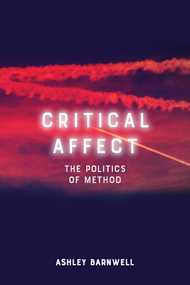
Barnwell, Ashley. Critical Affect: The Politics of Method. Edinburgh University Press, 2020
Critical Affect explores the emotional complexity of critique and maps out its enduring value for the turn to affect and ontology. Through a series of vivid close readings, Ashley Barnwell shows how suspicion and methods of decoding remain vital to both civic and academic spaces, where concerns about precarity, transparency, and security are commonplace and the question of how we verify the truth is one of the most polarising of our age.
The book addresses the important yet overlooked implications for critical methods in influential work on affect, non-representational, and actor-network theories and situates current debates within enduring ethical discussions about how to represent lived experience.
2019

Why white Australia can't
solve black problems
Maddison, Sarah. The Colonial Fantasy: Why white Australia can't solve black problems. Allen & Unwin, 2019.
Australia is wreaking devastation on Aboriginal and Torres Strait Islander people. Whatever the policy, government has done little to improve the quality of life of Indigenous people. In far too many instances, interaction with governments has only made Indigenous lives worse. Despite this, many Indigenous and non-Indigenous leaders and commentators still believe that working with the state is the only viable option. The result is constant churn and reinvention in Indigenous affairs, as politicians battle over the 'right' approach to solving Indigenous problems.
The Colonial Fantasy considers why Australia persists in the face of such obvious failure. It argues that white Australia can't solve black problems because white Australia is the problem, and calls for a radical restructuring of the relationship between black and white Australia.
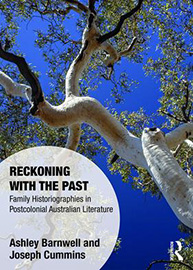
Family Historiographies in
Postcolonial Australian Literature
Barnwell, Ashley and Cummins, Joseph. Reckoning with the Past: Family Historiographies in Postcolonial Australian Literature. Routledge, 2019
This is the first book to examine how Australian fiction writers draw on family histories to reckon with the nation's colonial past. Located at the intersection of literature, history, and sociology, it explores the relationships between family storytelling, memory, and postcolonial identity. With attention to the political potential of family histories, Reckoning with the Past argues that authors' often autobiographical works enable us to uncover, confront, and revise national mythologies. An important contribution to the emerging global conversation about multidirectional memory and the need to attend to the effects of colonisation, this book will appeal to an interdisciplinary field of scholarly readers.
Douglas, Kate and Barnwell, Ashley (eds.,). Research Methodologies for Auto/Biography Studies. Routledge, 2019
This collection of short essays provides a rigorous, rich, collaborative space in which scholars and practitioners debate the value of different methodological approaches to the study of life narratives and explore a diverse range of interdisciplinary methods. Auto/biography studies has been one of the most vibrant sub-disciplines to emerge in the humanities and social sciences in the past decade, providing significant links between disciplines including literary studies, languages, linguistics, digital humanities, medical humanities, creative writing, history, gender studies, education, sociology, and anthropology.
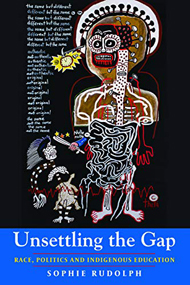
Rudolph, Sophie Unsettling the Gap: Race, politics and Indigenous education. Peter Lang, 2019.
Unsettling the Gap: Race, Politics and Indigenous Education examines pressing issues of inequality in education. The notion of gap – and the need to close it – is used widely in public and policy debates to name the nature and scope of disadvantage. In the competitive world of education, gaps have become associated with students who are seen to be “falling behind,” “failing” or “dropping out.” A global deficit discourse is, therefore, mobilised and normalised. But this discourse has a history and is deeply political. Unsettling the Gap examines this history and how it is politically activated through an analysis of the “Australian Closing the Gap in Indigenous Disadvantage” policy. In this policy discourse the notion of gap serves as a complex and multiple signifier, attached to individuals, communities and to national history.
In unravelling these diverse modalities of gap, the text illuminates the types of ruling binaries that tend to direct dynamics of power and knowledge in a settler colonial context. This reveals not only the features of the crisis of "Indigenous educational disadvantage" that the policy seeks to address, but the undercurrents of a different type of crisis, namely the authority of the settler colonial state. By unsettling the normalised functions of gap discourse the book urges critical reflections on the problem of settler colonial authority and how it constrains the possibilities of Indigenous educational justice.
2018
López López, Ligia (Licho) The Making of Indigeneity, Curriculum History, and the limits of Diversity Routledge, 2018
Conceptually rich and grounded in cutting-edge research, this book addresses the often-overlooked roles and implications of diversity and indigeneity in curriculum. Taking a multidisciplinary approach to the development of teacher education in Guatemala, López provides a historical and transnational understanding of how "indigenous" has been negotiated as a subject/object of scientific inquiry in education. Moving beyond the generally accepted "common sense" markers of diversity such as race, gender, and ethnicity, López focuses on the often-ignored histories behind the development of these markers, and the crucial implications these histories have in education – in Guatemala and beyond – today.
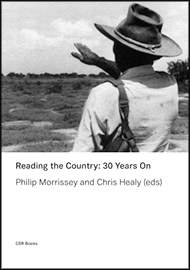
Morrissey, Philip and Healy, Chris (eds.). Reading the Country: 30 Years On. UTS ePress, 2018
Steeped in story-telling and endlessly curious, Reading the Country: An Introduction to Nomadology (1984) was the product of Paddy Roe, Stephen Muecke and Krim Benterrak experimenting with what it might be like to think together about country. Their book has since become one of the great twentieth-century works of intercultural dialogue.
Reading the Country: 30 Years On is a celebration of that book - examining not only its place and time of creation but also its movement across social, philosophical and political surfaces, seeping into the way we look and learn and teach about how people are, or could be, part of country.
Nolan, David, Farquharson, Karent and Marjoribanks, Timothy (eds.). Australian Media and the Politics of Belonging. Anthem Press, 2018
Australian Media and the Politics of Belonging explores mediated debates about belonging in contemporary Australia by combining research that proposes conceptual and historical frameworks for understanding the concept in the Australian context. A range of themes and case studies make the book a significant conceptual resource as well as a much-needed update on work in this area. Australian Media and the Politics of Belonging also provides an intervention that engages with key contemporary issues, questions and problems around the politics of belonging that are relevant not only to academic debate, but also to contemporary policy development and media and popular discussion.
2017
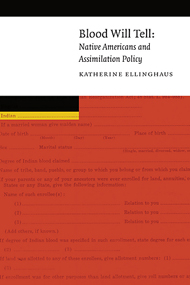
and Assimilation Policy
Ellinghaus, Katherine. Blood Will Tell: Native Americans and Assimilation Policy. University of Nebraska Press, 2017
Blood Will Tell reveals the underlying centrality of "blood" that shaped official ideas about who was eligible to be defined as Indian by the General Allotment Act in the United States. Katherine Ellinghaus traces the idea of blood quantum and how the concept came to dominate Native identity and national status between 1887 and 1934 and how related exclusionary policies functioned to dispossess Native people of their land. The U.S. government’s unspoken assumption at the time was that Natives of mixed descent were undeserving of tribal status and benefits, notwithstanding that Native Americans of mixed descent played crucial roles in the national implementation of allotment policy.
The role of blood quantum is integral to understanding how Native Americans came to be one of the most disadvantaged groups in the United States, and it remains a significant part of present-day debates about Indian identity and tribal membership. Blood Will Tell is an important and timely contribution to current political and scholarly debates.
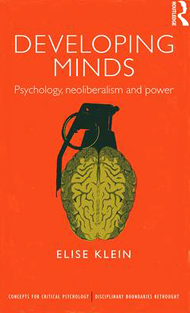
neoliberalism and power
Klein, Elise. Developing Minds: Psychology, neoliberalism and power. Routledge, 2017
Development policy makers and practitioners are becoming increasingly sophisticated in their ability to target 'development' interventions and the psychological domain is now a specific frontier of their interventional focus. This landmark study considers the problematic relationship between development and psychology, tracing the deployment of psychological knowledge in the production/reproduction of power relations within the context of neoliberal development policy and intervention. It examines knowledge production and implementation by actors of development policy such as the World Bank and the neo-colonial state - and ends by examining the proposition of a critical psychology for more emancipatory forms of development.
The role of psychology in development studies remains a relatively unexplored area, with limited scholarship available. This important book aims to fill that gap by using critical psychology perspectives to explore the focus of the psychological domain of agency in development interventions. It will be essential reading for students, researchers, and policy makers from fields including critical psychology, social psychology, development studies and anthropology.
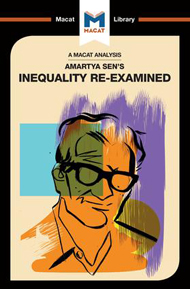
Inequality Re-examined
Klein, Elise. Reading Amartya Sen’s Inequality Re-examined. Routledge, 2017
Amartya Sen's Inequality Re-examined is a seminal text setting out a theory to evaluate social arrangements and inequality. By asking the question, 'equality of what'?, Sen shows that (in)equality should be assessed as human freedom; for people to have the ability to pursue and achieve goals they value or have reason to value.
The text lays out the fundamental ideas to Amartya Sen's Capability Approach. This approach is celebrated in diverse academic disciplines because of its specific contribution towards the improvement to debates on inequality beyond economic deprivation and utility measures. Furthermore, the arguments put forward by Sen in Inequality Re-examined has had many practical applications throughout policy circles including the Human Development Index, the Multi-Dimensional Poverty Measure, the compilation of lists of capabilities and drawing further attention to human agency and democracy. Amartya Sen won the Nobel Prize for Economics in 1998 for his contribution to welfare economics; the core arguments of this work is found in this book.
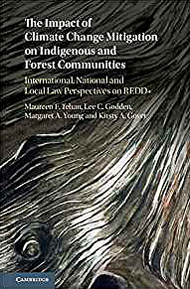
Mitigation on Indigenous
and Forest Communities
Tehan, Maureen, Godden, Lee, Young, Margaret, and Gover, Kirsty. The Impact of Climate Change Mitigation on Indigenous and Forest Communities: International, National and Local Law Perspectives on REDD+. Cambridge University Press, 2017
The international legal framework for valuing the carbon stored in forests, known as 'Reducing Emissions from Deforestation and Forest Degradation' (REDD+), will have a major impact on indigenous peoples and forest communities. The REDD+ regime contains many assumptions about the identity, tenure and rights of indigenous and local communities who inhabit, use or claim rights to forested lands. The authors bring together expert analysis of public international law, climate change treaties, property law, human rights and indigenous customary land tenure to provide a systemic account of the laws governing forest carbon sequestration and their interaction. Their work covers recent developments in climate change law, including the Agreement from the Conference of the Parties in Paris that came into force in 2016. The Impact of Climate Change Mitigation on Indigenous and Forest Communities is a rich and much-needed new contribution to contemporary understanding of this topic.
2016
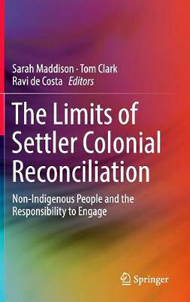
Colonial Reconciliation:
Non-Indigenous People and
the Responsibility to Engage
Maddison, Sarah, Clark, Tom, and de Costa, Ravi (eds.). The Limits of Settler Colonial Reconciliation: Non-Indigenous People and the Responsibility to Engage. Springer, 2016
This book investigates whether and how reconciliation in Australia and other settler colonial societies might connect to the attitudes of non-Indigenous people in ways that promote a deeper engagement with Indigenous needs and aspirations. It explores concepts and practices of reconciliation, considering the structural and attitudinal limits to such efforts in settler colonial countries. Bringing together contributions by the world's leading experts on settler colonialism and the politics of reconciliation, it complements current research approaches to the problems of responsibility and engagement between Aboriginal and non-Aboriginal peoples.
2015
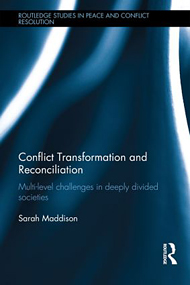
and reconciliation: Multi-level
challenges in deeply
divided societies
Maddison, Sarah. Conflict transformation and reconciliation: Multi-level challenges in deeply divided societies. Routledge, 2015
This book examines approaches to reconciliation and peacebuilding in settler colonial, post-conflict, and divided societies. In contrast to current literature, this book provides a broader assessment of reconciliation and conflict transformation by applying a distinctive 'multi-level' approach. The analysis provides a unique intervention in the field, one that significantly complicates received notions of reconciliation and transitional justice, and considers conflict transformation across the constitutional, institutional, and relational levels of society.
Drawing on extensive fieldwork in South Africa, Northern Ireland, Australia, and Guatemala, the work presents an interdisciplinary study of the complex political challenges facing societies attempting to transition either from violence and authoritarianism to peace and democracy, or from colonialism to post-colonialism. Informed by theories of agonistic democracy, the book conceives of reconciliation as a process that is deeply political, and that prioritises the capacity to retain and develop democratic political contest in societies that have, in other ways, been able to resolve their conflicts.
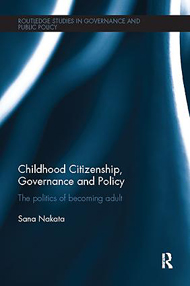
Governance and Policy: the
politics of becoming adult
Nakata, Sana. Childhood Citizenship, Governance and Policy: the politics of becoming adult. Routledge, 2015
Debates about children's rights not only concern those things that children have a right to have and to do but also our broader social and political community, and the moral and political status of the child within it.
This book examines children's rights and citizenship in the USA, UK and Australia and analyses the policy, law and sociology that govern the transition from childhood to adulthood. By examining existing debates on childhood citizenship, the author pursues the claim that childhood is the most heavily governed period of a liberal individual's life, and argues that childhood is an intensely monitored period that involves a 'politics of becoming adult'. Drawing upon case studies from the USA, the UK and Australia, this concept is used to critically analyse debates and policy concerning children's citizenship, criminality, and sexuality. In doing so, the book seeks to uncover what informs and limits how we think about, talk about, and govern children's rights in liberal societies.
Laidlaw, Zoe and Lester, Alan (eds.). Indigenous Communities and Settler Colonialism: Land Holding, Loss and Survival in an Interconnected World. Basingstoke: Palgrave Macmillan, Cambridge Imperial and Post-Colonial Studies series, 2015.
The new world created through Anglophone emigration in the 19th century has been much studied. But there have been few accounts of what this meant for the Indigenous populations. This book shows that Indigenous communities tenaciously held land in the midst of dispossession, whilst becoming interconnected through their struggles to do so.